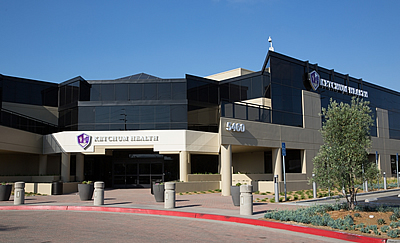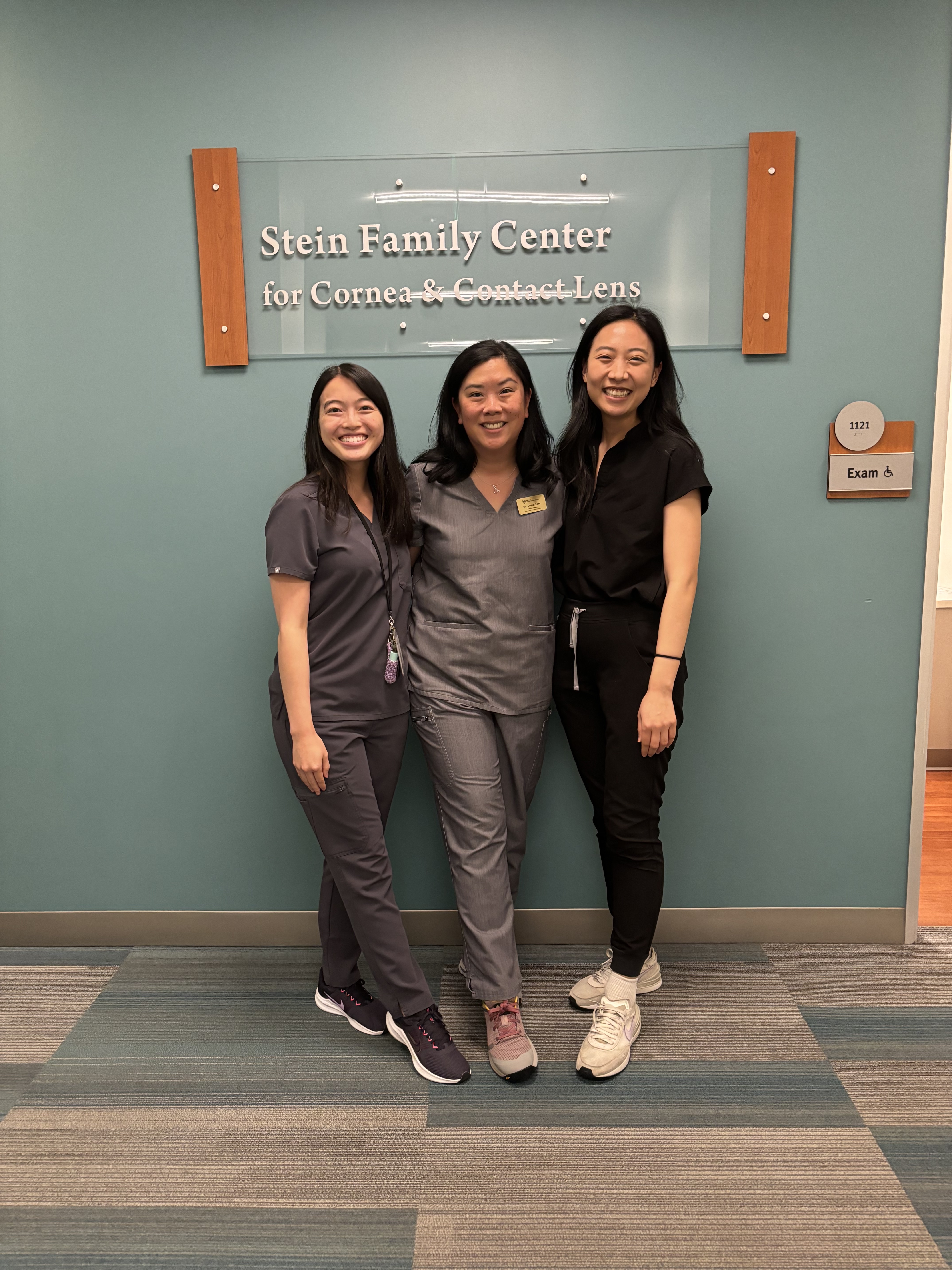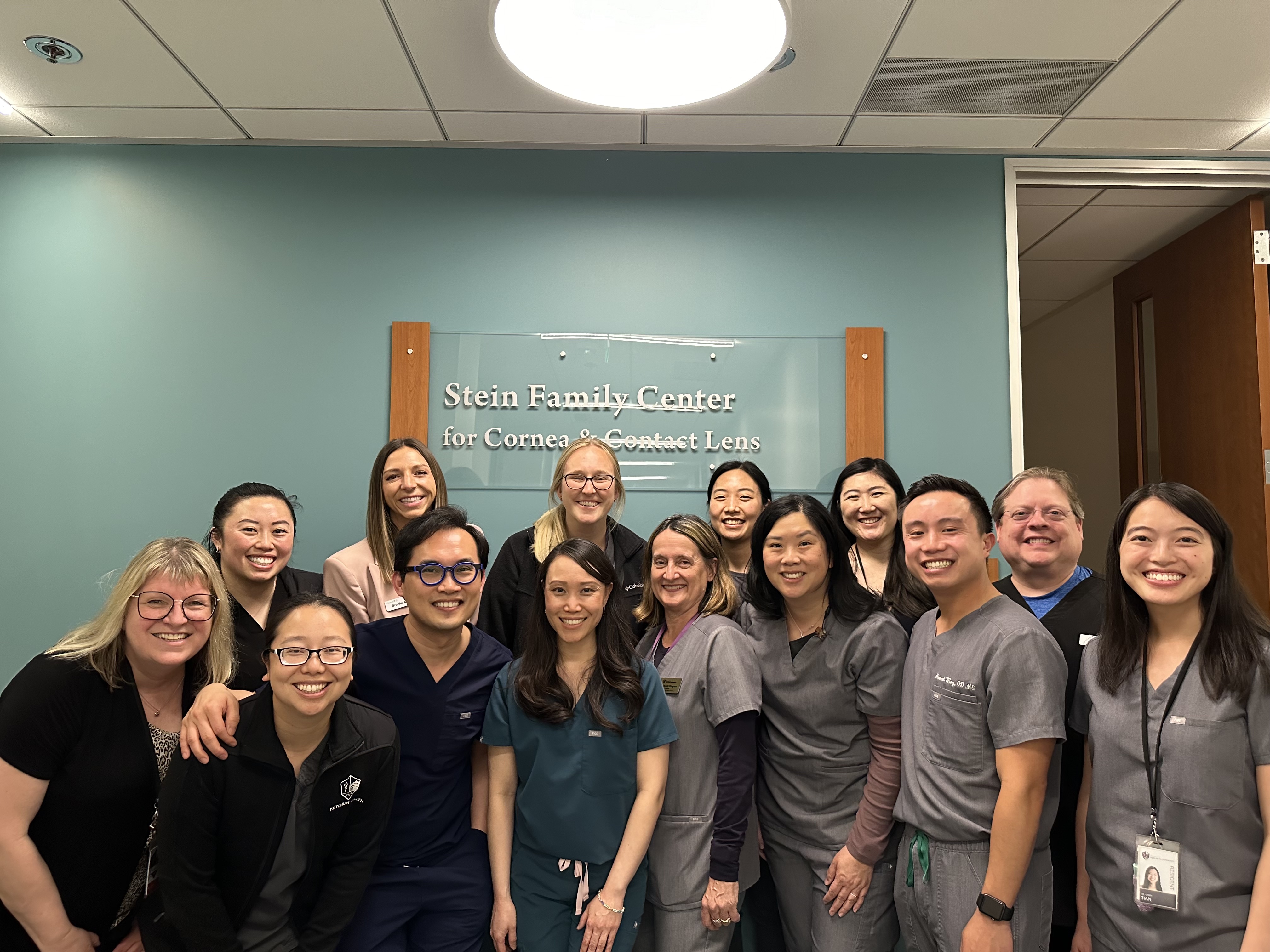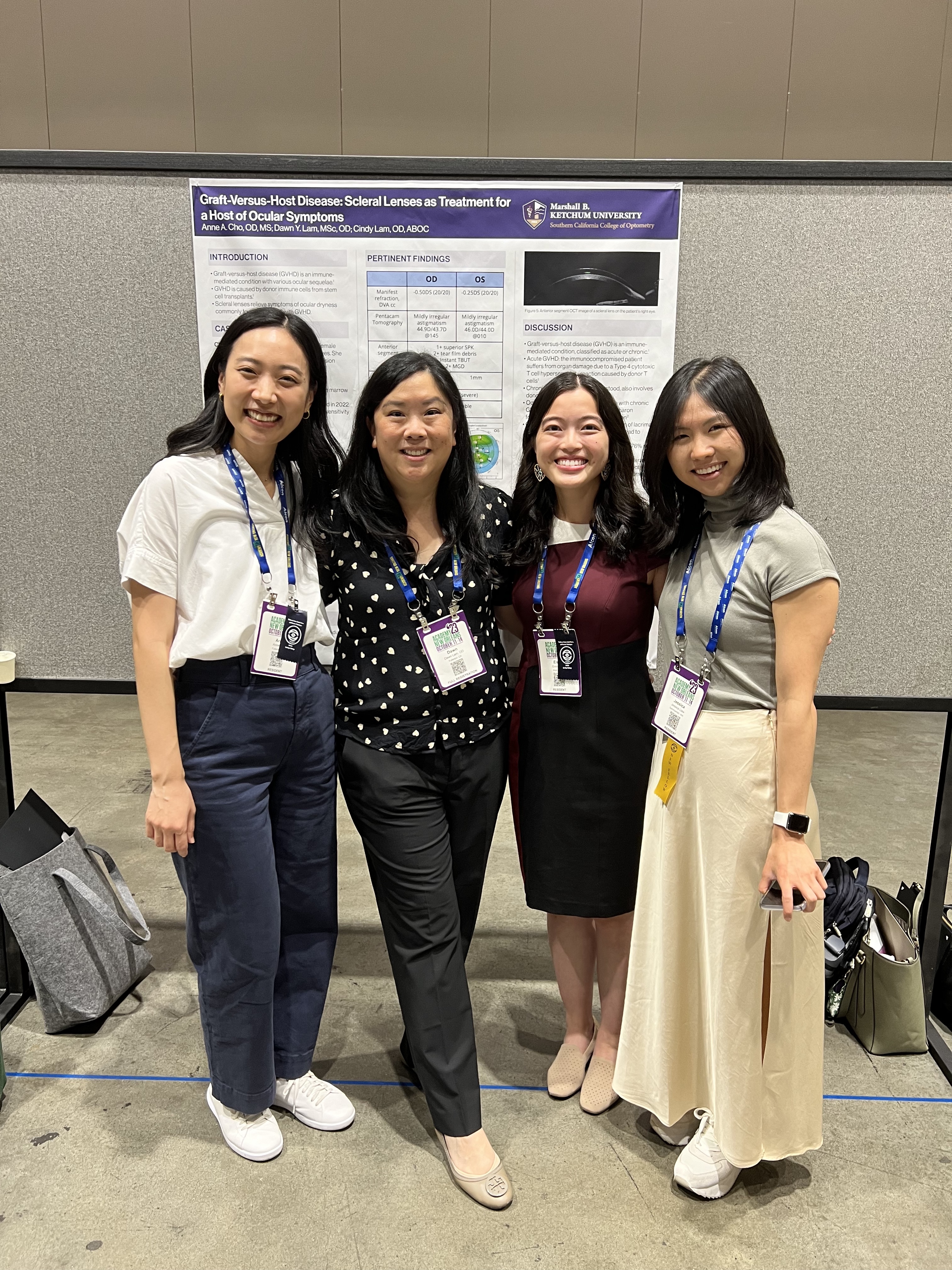Residency in Cornea and Contact Lenses

Established: 1991
Positions: Two
University Eye Center (UEC) at Ketchum Health
Southern California College of Optometry (SCCO) at
Marshall B. Ketchum University (MBKU)
5460 E. La Palma Ave.
Anaheim, CA 92807
Program Faculty
Residency Coordinator: Dawn Lam MSc, OD, FAAO
Attending Faculty Members and Area of Special Interest:
- Elaine Chen, OD, FAAO, FSLS / Irregular Corneas, Myopia Control, Dry Eyes, Scleral Lens
- Anne Arah Cho, OD / Irregular Corneas, Scleral Lenses
- Dawn Lam, MSc, OD, FAAO / Irregular Corneas, Myopia Control, Ocular Prosthetics
- Eunice Myung Lee, OD, FAAO / Pediatric Contact Lens Care
- Erin Rueff, OD, PhD, FAAO* / Irregular Corneas, Orthokeratology, Dry Eyes, Refractive Surgery Co-Management
- Heidi Wagner, OD, MPH, FAAO*/ Irregular Corneas, Myopia Control
- Erin Tomiyama, OD, PhD, FAAO / Irregular Corneas, Myopia Control
- Michael Wong, OD, FAAO / Irregular Corneas, Scleral Lens
- Lauren Zabaleta, OD, FAAO / Irregular Corneas, Scleral Lens
Biographies for each of the Cornea and Contact Lens residency faculty may be found on-line at ketchum.edu/directory.
*Faculty who are diplomates of the Cornea and Contact Lens and Refractive Technology (CCLRT) section of the American Academy of Optometry (AAO)
Mission Statement
The mission of the cornea and contact lens residency is to develop the resident to attain advanced competency in the area of specialty contact lens fitting and management, as well as in the assessment and management of corneal disease using full scope optometric procedures and treatment options.
Program Description
The CCL residency is based at the University Eye Center at Ketchum Health, a full-equipped patient care facility owned and operated by the Southern California College of Optometry at Marshall B. Ketchum University (SCCO @ MBKU). The residency is full-time, formal, supervised program combining patient care, didactic education, teaching experience and scholarly activities.
Program Goals
- To develop advanced competency in the fitting and management of corneal and scleral contact lenses for patients with irregular corneas. This includes patients with conditions such as keratoconus, corneal dystrophy, post-corneal transplant and post-refractive surgery ectasia.
- To develop advance competency in the area of anterior segment disease. These conditions include management of patients with ocular surface disease, ocular trauma, acute red eyes and corneal dystrophies and degenerations.
- To develop the resident's skills and proficiency in fitting and designing prosthetic lenses, shells and eyes.
- To develop the resident's skills and proficiency in examining and fitting pediatric patients with contact lenses.
- To develop the resident's appreciation of scholarly activities, life-long learning, and skills to disceminate knowledge.
- To prepare the resident for clinical teaching and independent practice.
- To develop the resident's interactive communication skills and appreciation of effective co-management with other providers
Program Objectives
- The resident will accurately select an appropriate specialty contact lens (corneal, scleral, or hybrid) for irregular cornea patients utilizing technology such as corneal topography, corneal topography, and ocular coherence tomography.
- The resident will customize lens parameters, including diameter, base curve, and peripheral curves, to achieve optimal fit, comfort, and visual acuity. They will assess the fit of the lenses using slit lamp biomicroscopy and anterior segment ocular coherence tomography.
- The resident will see a minimum of 450 contact lens patient visits during their residency year. They will see a minimum of 30 corneal lens and 30 scleral lens fits.
- The resident will gain experience in managing patients with anterior segment disease through observations and shadowing with ophthalmology services at the University of Southern California and University of California Irvine.
- The resident will manage dry eye patients at the UECKH.
- The resident will see a minimum of 10 prosthetic patients where they will will fit and evaluate a variety of prosthetic lenses, shells or eyes utilizing diagnostic fitting sets and will evaluate for optimal fit, cosmesis and comfort.
- The resident will gain proficiency in designing prosthetic contact lenses including the selection of pupil sizes, colors and patterns.
- The resident will see a minimum of 10 pediatric patients (<3 years of age) to determine candidacy for contact lenses where they will conduct ocular examinations, including detailed history from parents or guardians, perform age-appropriate visual acuity assessments and refractions and design an appropriate lens for this population.
- The resident will fit specialty contact lenses (ex: orthokeratology) on pediatric patients for either vision correction or myopia management.
- The resident will read articles, attend continuing education courses, view webinars, create and present lectures, and create and present posters. The residents will be directed to read seminal articles in corneal and contact lenses to improve their ability to provide evidence-based care to their patients.
- The resident will develop an appreciation for lifelong learning and the importance of disseminating information by attending annual meetings such as AAO and GSLS and regularly participate in a guided literature review (journal club).
- The resident will write a case report of publishable quality with emphasis on contact lenses and diagnosis and management of corneal and related contact lens problems.
- The resident will precept third and fourth year students providing patient care, facilitate group discussions in the contact lens seminar and grand rounds course, participate in continuing education lectures and workshops.
- The residents will shadow corneal ophthalmologists performing surgery and patient care rounds at the University of California, Irvine, (UCI) Department of Ophthalmology. The residents will also shadow an optometric provider at the University of Southern California (USC) Eye Institute.
Typical Weekly and Daily Schedule at the University Eye Center
The residency is 12 months in length, beginning July 1 and ending June 30. The residents are scheduled 32 hours per week of direct contact lens patient care. The residents receive weekly individual tutorial instruction with the cornea and contact lens residency coordinator. Patient cases are also reviewed at this time. In addition, the resident receives individual tutorial instruction from the members of the cornea and contact lens service faculty.
During the Spring Quarter, the residents each independently staff SCCO/MBKU optometry students providing patient care at the UEC. Scholarly activity time includes library time, poster presentations for the American Academy of Optometry (AAO) and Global Specialty Lens Symposium meetings, research design, data collection, and final paper preparation, developing lectures for CE courses and students, etc. The cornea and contact lens residents participate in UEC's after-hours doctor-on-call rotation.
The residents are provided a schedule on a quarterly basis from the residency coordinator, which coincides with the College’s academic calendar. The schedule included direct patient care, scholarly/administrative time, and teaching opportunities.
This is a typical weekly schedule for the CCL resident.
|
MONDAY |
TUESDAY |
WEDNESDAY |
THURSDAY |
FRIDAY |
|
8am – 12pm Direct Patient Care |
8am – 12pm Scholarly / Administrative Activities |
8am – 12pm Prosthetics Clinic |
8am – 12pm Pediatric CL Clinic |
8am – 10am Direct Patient Care 10am – 12pm Meet with Dr. Lam |
|
12pm – 1pm Lunch |
12pm – 1pm CL Service Meeting |
12pm – 2pm Lunch |
12pm – 1pm Journal Club |
12pm – 1pm Lunch |
|
1pm – 5pm Direct Patient Care |
1pm – 3pm Meet with Dr. Lam 3pm – 5pm Direct Patient Care |
2pm – 6pm Direct Patient Care |
1pm – 2pm Seminar Topic 3pm – 5pm Direct Patient Care |
1pm – 5pm Direct Patient Care |
*Schedule is subject to change each quarter to align with the academic calendar at the College.
Type and Number of Patients
The residents provide care to patients with irregular corneas. This includes patients with conditions such as keratoconus, corneal dystrophy, post-corneal transplant and post-refractive surgery ectasia. They provide care to patients with anterior segment disease including patients with ocular surface disease, ocular trauma, acute red eyes and corneal dystrophies and degenerations. During their residency year, they also have the opportunity to fit and design prosthetic lenses, shells and eyes. They work with the faculty and residents in the pediatric service to manage pediatric patients requiring lens correction for aphakia. The residents also see patients for myopia management. The resident will see a minimum of 450 contact lens patient visits during their residency year.
After Hours On-Call Responsibilities
The CCL residents will share an after-hours on-call schedule with the Pediatric Optometry and Vision Therapy and Rehabilitation (POVT) residents. The residents are on-call a week at a time and paired with a faculty member from SCCO. Because four residents rotate through the on-call schedule, each resident will end up being on-call approximately 25% of the time during their residency year.
Teaching Responsibilities
Residents will on occasion have third- or fourth-year professional students assigned to observe and assist them in the fitting and follow-up care of contact lens patients. It is expected that the residents will reinforce and validate the knowledge and clinical skills developed by sharing them with the students, thus enhancing the learning experience.
The residents directly supervise optometric interns in the UEC one half day per week during the latter part of the residency. The residents also actively participate as a discussion leader for the third-year students’ cornea and contact lens seminar and grand rounds course.
Lecturing Opportunities
The residents are afforded opportunities to present lectures to the second, third- and fourth-year students as part of the contact lens curriculum. Opportunities also exist to present continuing education courses at SCCO and at local optometric societies.
Scholarly Activities
Scholarly activity will include the following:
|
Thesis Paper |
| Preparation and completion of a case series paper or original research project suitable for presentation and publication is a requirement of the program. |
| Scleral GP and Orthokeratology Lens Fitting Evenings |
| The residents conduct a fitting workshop for our third-year optometric students. |
Stipend
The residents will receive an annual stipend of $66,560 (not contingent upon productivity). No tuition or application fees are paid by the residents to the University.
Benefits
| Health | The University offers the resident the option of electing to purchase medical insurance, as per the Affordable Care Act (ACA). Residents will receive information from Human Resources during a new hire orientation. |
| 403(B) Voluntary Retirement Savings Plan | Residents have the opportunity to articipate by contributing to the University 403(B) Voluntary Retirement Savings Plan. |
| Holidays | Resident are given approximately 13 days off during the Thanksgiving and Christmas holidays. Residents also get one floating holiday to be used only for religious or cultural holidays, employee birthdays, or other state or federal holidays during which the University remains open. |
| Educational Travel | Residents are encouraged to apply for travel grants through the American Academy of Optometry (AAO) section on Cornea, Contact Lenses and Refractive Technologies, to attend the AAO Annual Meeting. Externally sponsored travel grants may available for the GPLI and Global Specialty Lens Symposium. |
| Paid Time Off | Residents will be provided 5 days of paid time off. Should the resident request additional days off, both the residency coordinator and the director of residency programs must approve it. Equivalent time is subject to be made up for time off beyond 5 days. |
| Liability Insurance Coverage | The residents will be provided with professional liability insurance while practicing at UEC. |
Completion Requirements
- Quarterly Encounter Activity Report
- Quarterly Patient Diagnosis Log
- Quarterly Faculty Evaluations
- Quarterly Program Evaluations
- Quarterly Resident Referral Log
- Quarterly Resident Activity Log
- Quarterly Resident Reading Log
- End of the Year Evaluation of Program
- Certification of Completion of Residency Requirements
- Resident Contact Address after Completion
- Be present for complete academic year from July 1 through June 30 except when on approved vacation, sick or authorized absence days.
- Provide quality, compassionate, and ethical care to all UEC patients.
- Prepare and complete a case series paper or original research project suitable for presentation and publication.
- Prepare and present a lecture for SCCO at MBKU Residency Forum.
- Reconcile any charges at the bookstore and return any borrowed library resources.
Application Prerequisites
- Attainment of the O.D. degree from a school or college of optometry accredited by the Accreditation Council on Optometric Education (ACOE).
- Successful completion of the National Board of Examiners in Optometry (NBEO) Part I and II;
- Completion of NBEO Part III is preferred, but not always possible due to the timing when scores are released
- Passing the California State Board of Optometry Law Exam is preferred, but not mandatory before the interview
- Applicants must submit three letters of recommendation; two letters must be from full-time faculty members who have been most responsible for the clinical education of the applicant.
- Applicants must apply through the ORMatch Application Service on or before January 10th of the residency year
- Applicants are required to provide the following documents:
- A current curriculum vitae (CV).
- A one-page letter of intent, discussing the reasons for pursuing residency training, in general, and this program, in particular; expectations from the residency experience; any interested areas of specialization; and future professional goals.
- Transcripts of work completed in professional school; official transcripts are needed if an interview is granted
- NBEO transcripts of completed sections.
Selection Process:
- An interview is required.
- After receiving all the ORMatch applications to the program, each applicant is contacted to see whether he / she will be offered an interview.
- The Residency Coordinator, the Chief of the Contact Lens Service, and other available Contact Lens Faculty will conduct the interview.
- Each member of the interviewing team will conduct their evaluation independently and state the residency candidate’s strengths and weakness. When all the applicants have been interviewed and interviewers have completed their evaluation, the Residency Coordinator will collect all feedback and subsequently an open discussion among the interviewers will ensue to discuss the ranking of the applicants.
- The Residency Coordinator then submits the names of the residency candidates to ORMatch before the deadline.
Program Accreditation
The Accreditation Council on Optometric Education (ACOE) has granted the CCL University Eye Center at Ketchum Health Residency Program the accreditation status of “Accredited.” Accredited is a classification granted to an educational program indicating that the program generally meets the Standards for accreditation. For more information, see the ACOE’s website at www.theACOE.org or contact the ACOE at accredit@theacoe.org.



Contact Information
Dawn Lam, MSc, OD, FAAO
Cornea and Contact Lens Residency Coordinator / Associate Professor
Southern California College of Optometry at
Marshall B. Ketchum University
2575 Yorba Linda Blvd.
Fullerton, CA 92831
714.463.7573 • dlam@ketchum.edu
Judy W.H. Tong, OD, FAAO
Assistant Dean of Residencies
Southern California College of Optometry at
Marshall B. Ketchum University
2575 Yorba Linda Blvd.
Fullerton, CA 92831-1699
714.463.7568 • Fax: 714.992.7811• jtong@ketchum.edu
